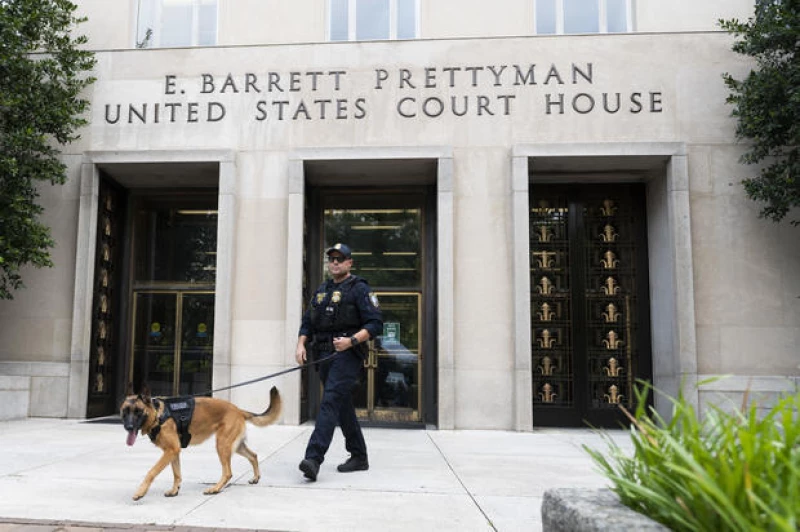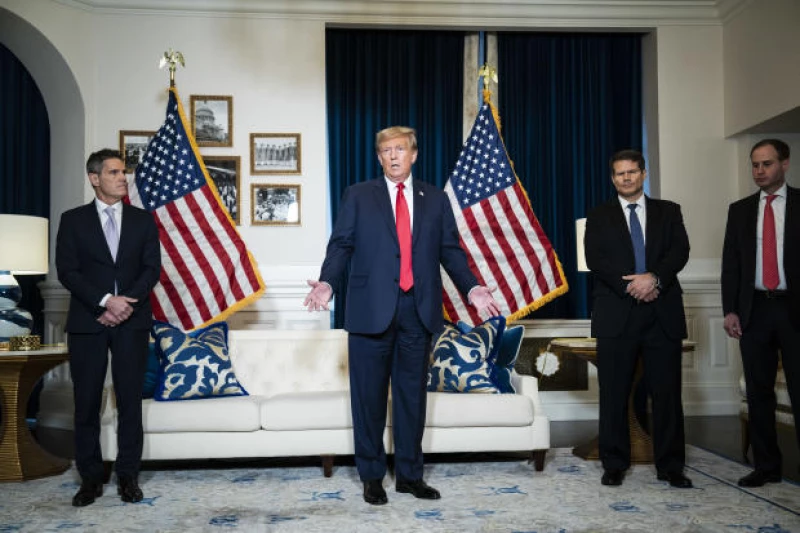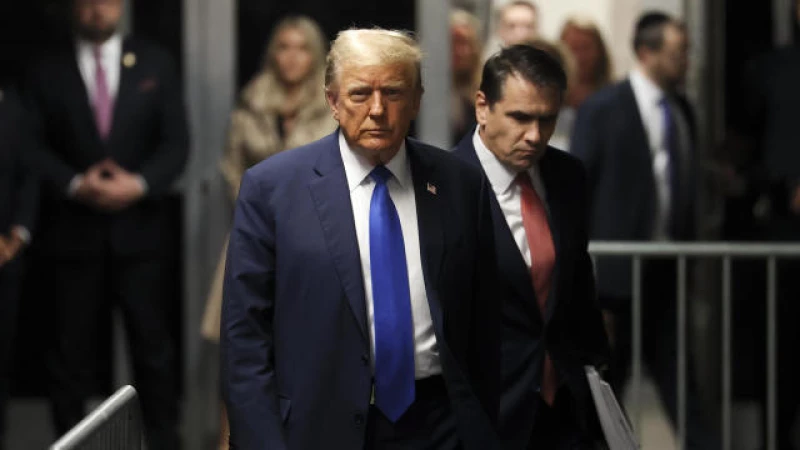Supreme Showdown: Trump's Immunity on Trial
Washington — The Supreme Court is set to convene Thursday to consider whether former President Donald Trump is entitled to sweeping immunity from criminal prosecution for what he says were official acts taken while he occupied the White House.
The outcome of the dispute, known as Trump v. U.S., will have ramifications for the case brought against the former president in Washington, D.C., by special counsel Jack Smith, who alleges Trump engaged in an unlawful scheme to overturn the results of the 2020 election.
A ruling in Trump's favor would bring the prosecution to an end. But if Smith prevails and Trump's claims of immunity are rejected, proceedings in the case, which have been paused for months, would pick back up, although it's unclear how quickly it would go to trial.
A victory for the special counsel would significantly raise the stakes of the 2024 election for Trump, since he could order the Justice Department to drop the case if reelected to the White House.
The origins of Trump's immunity claim date back to last fall, when his attorneys first raised the issue. The Supreme Court's decision is expected by the end of June. Here's how the case arrived before the justices:
2023
Aug. 1: Trump is indicted on four counts in federal court in Washington. Prosecutors allege he and others orchestrated a scheme to keep him in power despite losing the 2020 presidential election.
Aug. 3: Trump pleads not guilty to all four counts before a federal magistrate judge.
Oct. 5: Trump's attorneys file a motion to dismiss the charges against him based on presidential immunity. In their 52-page filing, they argue that he is entitled to absolute immunity, in part to ensure that presidents can serve "unhesitatingly, without fear" of future prosecution by political opponents for decisions they dislike.
Defense attorneys argue that the conduct alleged in the indictment lies "at the heart" of Trump's official responsibilities as president.
Oct. 19: Prosecutors with Smith's team oppose Trump's bid to toss out the indictment on immunity grounds. In a 54-page filing, they tell the U.S. District Court for the District of Columbia that neither the Constitution nor Supreme Court precedent supports the sweeping immunity he asserted.
It is argued that a former president can be investigated, indicted, tried, and, if found guilty, punished for actions taken while in office. The assertion is made that Trump's actions to undermine the transfer of presidential power were done in his capacity as a candidate for elective office.
The special counsel alleges that Trump acted deceptively or corruptly to gain a personal advantage as a presidential candidate, rather than fulfilling the constitutional duties of the presidency.
Dec. 1: U.S. District Judge Tanya Chutkan denies Trump's request to dismiss the charges citing presidential immunity. She states that the Constitution does not provide broad protection from prosecution for official actions.
"While a sitting president may have certain immunities, there is only one president at a time, and that position does not grant a permanent shield from legal consequences," Chutkan writes. "Former Presidents are not exempt from federal criminal liability."
Chutkan emphasizes that Trump could be subject to federal investigation, indictment, prosecution, conviction, and punishment for any criminal activities during his time in office.
Dec. 7: Trump challenges Chutkan's ruling and appeals to the U.S. Court of Appeals for the District of Columbia Circuit, also requesting a halt to the proceedings until the appellate court's decision.
Dec. 11: Smith petitions the Supreme Court to skip the D.C. Circuit and quickly determine whether Trump can be criminally charged for alleged unlawful actions while in the White House.
The special counsel tells the justices that it's of "imperative public importance" that the Supreme Court resolve Trump's claims of immunity and, if they are rejected, for his trial to proceed "as promptly as possible."
Smith asks the high court to intervene in the case before the D.C. Circuit can hear arguments on whether Trump is entitled to sweeping immunity and issue a decision.
Dec. 13: Chutkan grants Trump's request to pause the proceedings in the case, but says that a limited gag order and an order governing the use of "sensitive" information in the case remain in force.
Dec. 22: The Supreme Court denies Smith's bid to fast-track the immunity case and leap-frog the D.C. Circuit, leaving the dispute before the appeals court.
2024
Jan. 9: A panel of three judges on the D.C. Circuit hears arguments on whether Trump is shielded from criminal prosecution. The judges assigned to the case are Judges Karen LeCraft Henderson, Michelle Childs and Florence Pan.
Henderson was appointed to the D.C. Circuit by President George H.W. Bush. Childs and Pan were tapped by President Biden.
During arguments, the judges question the limits of Trump's claims of broad immunity, including whether a president who orders the military to assassinate a political rival would be shielded from prosecution.

Feb. 6: The three-judge panel unanimously rules that Trump is not entitled to broad immunity from prosecution.
Feb. 14: Smith urges the Supreme Court to reject Trump's request for emergency relief and allow the D.C. Circuit's ruling to stand. Doing so would clear the way for the trial in the 2020 election case to proceed.
But the special counsel tells the justices that if they believe Trump's immunity claim warrants its review, they should take up the case on an expedited basis. He suggests the court set a schedule that would allow for oral arguments in March and an opinion shortly after.
Smith writes that if Trump is granted absolute immunity, it would upend understandings about presidential accountability that have prevailed throughout history while undermining democracy and the rule of law."
Feb. 28: The Supreme Court agrees to decide whether Trump is entitled to presidential immunity from prosecution for acts allegedly committed while in office.

The unsigned order specifies the question that the justices will consider: "whether and if so to what extent does a former president enjoy presidential immunity from criminal prosecution for conduct alleged to involve official acts during his tenure in office."
It also sets arguments for the week of April 22. The court indicates that proceedings in the case will remain on hold until it issues a decision, expected by the end of June.
March 19: Trump's legal team is making a plea to the Supreme Court, asking the justices to overturn the D.C. Circuit's ruling and assert that former presidents are shielded from criminal prosecution.
"Throughout the history of our nation, no former or current president has ever been criminally charged for their official actions - and for good reason," Trump's lawyers stated in their brief. "The ability of the president to effectively govern, and the essential independence of the presidency itself, would be compromised if a former president could be prosecuted for official acts after leaving office."
They contend that subjecting a former president to criminal charges would set a dangerous precedent for future presidents.
"If we allow this line to be crossed, every future president would be vulnerable to coercion and manipulation while in office, and would be haunted by politically motivated legal actions after their term, particularly in relation to their most contentious decisions," the brief argued. "This grim prospect would result in a feeble and ineffectual Commander-in-Chief, which would be catastrophic for the entire American political structure."
April 8: The special counsel has submitted their brief to the Supreme Court, asserting that Trump's alleged efforts to undermine the transfer of presidential power fell outside the scope of his official responsibilities.
"In this case, no presidential power allows the president to claim immunity from federal criminal charges such as fraud against the United States, obstruction of official proceedings, and denial of the right to vote," Smith and his team assert. "The president's duty to ensure that laws are faithfully executed does not give him the right to break them."
The special counsel and prosecutors emphasize to the justices that Trump's alleged actions to retain power after the 2020 election "undermine fundamental constitutional provisions that safeguard democracy."
They further argue that even if the Supreme Court rules that immunity can cover a former president's "official acts," Trump could still face prosecution as the accusations against him involve a "private scheme with private individuals to achieve a personal goal: the petitioner's attempt to retain power through deception."
April 25: The Supreme Court is scheduled to hear arguments in Trump v. United States. D. John Sauer will represent Trump, while Michael Dreeben will advocate for the special counsel.







